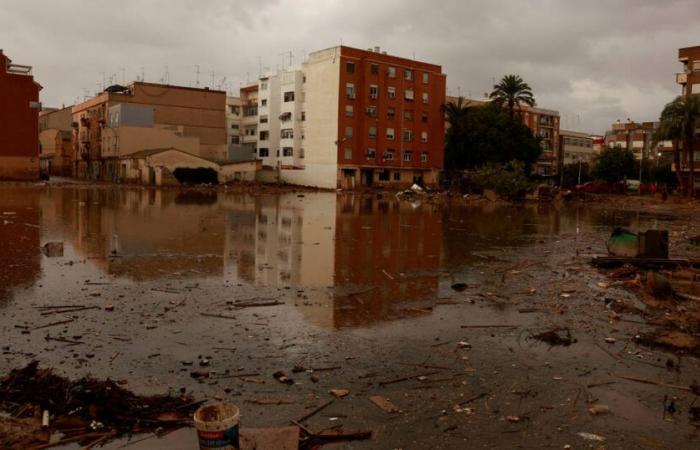The Spanish meteorological agency is advising residents of the coast near Valencia this Wednesday, November 13, to avoid travel due to the risk of flooding.
“The danger is extreme.” Two weeks after the tragic floods which affected the south-east of Spain, the Spanish Meteorological Agency placed the coastline near Valencia on red alert on the evening of Wednesday November 13 due to torrential rains. “Avoid travel. River overflows and flooding may occur.warned the Aemet Agency on
Up to 180 millimeters of rain could fall in twelve hours on the Valencia coast, according to Aemet forecasts. Traffic restrictions have been issued in areas already affected by the floods of October 29 which left at least 223 dead. Rail traffic between Barcelona and Valencia has also been suspended, announced the national operator Renfe.
New “cold drop”
The meteorological agency also issued a red alert on Wednesday in the provinces of Malaga (Andalusia, south) and Tarragona (Catalonia, northeast), due to this news “cold drop”an isolated high-altitude depression quite common in autumn on the Spanish Mediterranean coast. “Today, Malaga is paralyzed”declared the president of the Andalusia region Juan Manuel Moreno during the day, during a trip to Seville. “Prevention is better than cure, we saw it in Valencia”insisted the president of the region.
In Malaga, where several roads were flooded, the metro was closed, the train line to Madrid was suspended and flights were diverted. The municipality evacuated nearly 3,000 people “preventively”. “Everything is going well since we were warned last night”explains to AFP Ida Maria Ledesma Martin, resident of Campanillas, near Malaga: “This morning, around 10 a.m., police officers went through the streets to warn everyone, the deployment is very good and I think it is not exaggerated at all.”
Makeshift barricades
In the municipality of Paiporta, near Valencia, considered the epicenter of the disaster two weeks ago, residents had set up makeshift barricades with bags of earth in front of the doors of houses on Wednesday morning, particularly with the fear of see the sewers still blocked by mud overflow. These new rains have affected search operations for the 17 people still missing, concentrated mainly around waterways and on the coast, at river mouths.
“Search at sea was compromised due to the maritime storm”Rosa Tourís, spokesperson for Cecopi, Valencia's emergency committee, explained to the press. “After this meteorological episode, the tides will be evaluated again to determine the search areas”she added. As a precaution, several municipalities in the region had asked the thousands of volunteers who come every day to help residents clear the streets not to go to the disaster areas on Wednesday.
“Exceptional intensity”
In Andalusia and Catalonia, where the provinces placed on red alert of Malaga and Tarragona are located, the authorities had for their part anticipated the possible consequences of heavy rains by sending alert messages to mobile phones, the reception of which causes a loud beep. The authorities in Valencia were strongly criticized for sending this warning message late on October 29. Indignation against the authorities, accused of having poorly assessed the risks and of having delayed too long in the deployment of relief, gave rise to massive demonstrations on Saturday, the largest of which brought together 130,000 people in the city of Valencia.
The red alert issued by Aemet, corresponding to meteorological phenomena “exceptionally intense” presenting “a very high level of risk for the population”also led the authorities to suspend classes on Wednesday in part of Catalonia and in Andalusian cities such as Granada and Malaga. In this city, bad weather also led to the postponement to Friday of a match between Spain and Poland as part of the Billie Jean King Cup in women's tennis, which was to be played on Wednesday afternoon.






